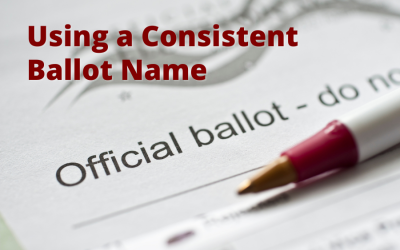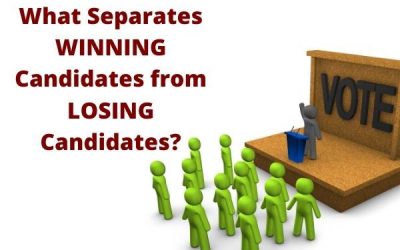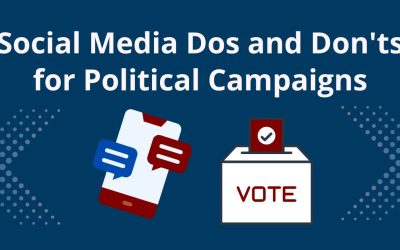Political Campaign Tip: Use A Consistent Ballot Name
What’s in a name? If you are running for office, it should be consistency.
For example, if you are appearing on the ballot as “John Quincy Smith,” don’t promote yourself as “John Smith” or “John Q. Smith.” Your political campaign website, signage, and all your promotional materials should match. A consistent ballot name helps build name brand identification and reduces voter confusion.
 In the case of write-in ballots, voters must use the correct version of your name. Write-in elections are tough to win, even in the best of circumstances. Proper spelling is important to withstand legal ballot challenges. To make things simple for write-ins, you might want to avoid using your middle name or initials in the campaign. Not every municipality allows for a “sticker campaign,” where a candidate provides voters with stickers with the candidate’s name as registered to attach to ballots as a write-in.
In the case of write-in ballots, voters must use the correct version of your name. Write-in elections are tough to win, even in the best of circumstances. Proper spelling is important to withstand legal ballot challenges. To make things simple for write-ins, you might want to avoid using your middle name or initials in the campaign. Not every municipality allows for a “sticker campaign,” where a candidate provides voters with stickers with the candidate’s name as registered to attach to ballots as a write-in.
A few years ago, in a local race, a candidate first announced that she was running in a press release using her first and last name. But when the first mailing went out, a middle name was added. By the end of the campaign, the name had morphed to first, middle, and a hyphenated last name. Most voters probably didn’t notice, but for those following the election, the constant name changes may have seemed odd.
Avoid nicknames and middle initials unless they are important to your branding. If the name or nickname is not often used consistently, it can be confusing to both voters and search engines. This can potentially cause your website to rank lower than it should for candidate name searches. On the other hand, sometimes a nickname can help boost voter recognition.
Some candidates have gone the route of completely changing their names to improve their chances of winning. One congressional candidate went so far as to change his ballot name to his website address. Another thought was that his name sounded too feminine, so he had it changed in time for the primary. And then there was the candidate who legally changed his name to ‘Pro-Life’. (The change apparently did not help, as he ran and lost in several elections.)
Finally, make sure that your ballot name is properly spelled out on all election materials, including absentee ballots. Whatever you do, don’t be that candidate who misspells their own name in their advertising!
Checklist Download: Campaign Branding and Marketing Checklist [PDF]
Do Write-in Candidates Ever Win?
A write-in campaign is a type of election in which people who are not on the ballot can nevertheless make themselves eligible to win by receiving enough valid write-in votes. Write-in campaigns are usually low-budget, grassroots efforts that take place in cases where the original candidate has either died, dropped out of the race, or ran unopposed.
It’s not impossible to win an election as a write-in candidate, but the odds are long. They tend to be more successful on a local or state level. There have only been a handful of congressional elections where a outsider candidate won a general election. It takes money and organization—the same things a regular campaign requires—only you don’t have party backing. The tactic is more likely to succeed in down-ballot elections, where a non-ballot candidate can secure a local primary win before succeeding in a general election.
State rules around this process aren’t uniform. Some places ask write-in candidates to officially declare their intention to run and often submit paperwork to either the state or local election office. Other states are more lenient. They let voters write in the name of virtually anyone, without formal requirements.

The role of write-ins in the election process
Winning as a outsider is not easy
To win as a outsider, you need to stand out in the crowd and convince the voters that you’re their best choice. A few things that can help with this:
- Be authentic: Show your true colors and be yourself. This will help people connect with you and know what they can expect from you in the future.
- Be genuine: If you’re not being genuine, it will show through your speech and body language. People will see right through it and not take what you say seriously.
- Be passionate: When it comes to winning as a outsider, passion is key! You need to be 100% invested in what you are doing if you want people to believe in your cause or campaign.
- Be a good speaker
- Have a strong social media presence
- Provide detailed plans and ideas on how to solve problems
The challenges of running a write-in campaign include:
- Fundraising difficulties and building a network of viable donors.
- Lack of promotion and advertising by the candidate.
- Securing volunteers to distribute yard signs, bumper stickers, and other promotional materials to supporters.
- Finding volunteers to help with the GOTV effort.
- Limited coverage by traditional news outlets, which often focus only on major party candidates.
- The candidate’s name, where it may be tricky to pronounce, leading to misspelled votes.
You can grow support by door-to-door canvassing, putting up signs, and running a digital campaign using a campaign website, and online advertising.
Free Digital Campaigning Tips: Subscribe for free political campaign guides and updates.
The process of a write-in campaign involves drafting your letter of intent and submitting it to your local election office. Then, gather signatures from qualified voters in your precinct. Make sure those signing have read and understood the petition.

Write-in votes may be cast improperly for a variety of reasons.
Provide detailed instructions to voters
Now comes the hard part of the process: Making sure that every vote cast for you is properly cast.
The most important part of write-in campaigns is letting the public how to cast a vote for you. Because voting for a candidate not listed on the ballot is different than a typical vote, you must carefully inform voters exactly what they must do so their votes are considered valid. Many states will not count a vote if the candidate’s name is not spelled correctly. Even where the name is written or the sticker is placed on the ballot is critical to casting a proper vote.
With more states voting by mail, these types of unofficial campaigns are becoming more prevalent. This is why it’s important to know the laws and rules – and to convey them properly to your supporters.
So, can you win as a write-in candidate?
Sometimes, a person can win an election without receiving the most votes. In a hotly contested election, there may be three or more candidates, and one who receives the most votes wins.
Sometimes a write-in candidate can even defeat an unopposed incumbent candidate. This is more likely to happen if the incumbent is unpopular.
Local elections can often be won by unlisted candidates because so few people turn out to vote in them. (Though this trend may be reversing.)
But generally, it takes as much effort, if not more, to get enough voters to choose a candidate who is not on the ballot. It may not be easy, but never underestimate determination and planning.
Create an affordable campaign website with Online Candidate. Every election cycle, we assist hundreds of local and grassroots campaigns.
Spring Cleaning For Your Campaign’s Social Media
Spring is finally here! Days are getting longer, and for many, it’s time for cleaning. If you are running for office, now is a great time to review your campaign social media accounts.
These tips apply to both campaign and personal accounts.
Update your campaign profile account information
 When was the last time you updated your social media profiles? Bios and profiles are often filled in when an account is created and then forgotten. Is all the information up-to-date? Are all the relevant fields completely filled in, including a link to your political campaign website?
When was the last time you updated your social media profiles? Bios and profiles are often filled in when an account is created and then forgotten. Is all the information up-to-date? Are all the relevant fields completely filled in, including a link to your political campaign website?
You may be surprised at the amount of information that is incomplete or out-of-date.
Related: Will Your Social Media Past Hurt Your Political Future?
Check your profile images
Others get their first impression of you through your profile (or avatar) image. Make sure that it is up-to-date and professional. If you are using a head shot for person profiles, make sure the image looks professional. Use proper lighting and positioning. (You don’t want it to look like a mug shot.)
Don’t crop your picture from a group photo or use a low-res, grainy image.
Your profile images should be consistent across platforms for branding purposes. While a mobile phone can take great pictures, consider hiring a professional photographer.
Photos and videos make the best content
Campaign photos and videos get attention. You can increase the visibility and engagement of your Facebook and Twitter posts by including photos. You’re more likely to have a post shared if it includes an image. While it may take a little work to add images, it’s worth the effort.
Unscripted, engaging content can get followers attention, such as giving a glimpse of what really goes on behind-the-scenes. Other ideas include supporter testimonial videos or educational content about the issues you are running on. Look at the posts that get the most views and shares. Consider using that material for a paid promotion.
Just make sure that you own or have properly licensed any images or videos that you use!
As an aside, never, ever use your personal Facebook profile for political campaigning activities. We see this all too often and tell clients to create a campaign Facebook page. You can certainly recommend your campaign page to your existing friends and followers, but keep your personal and political activities separate. If you don’t, you could find your account shut down completely.
Use a scheduling tool for your social media posts
While manually posting to social media provides the most control, consider using a scheduling tool. Services such as Buffer or Hootsuite let you share posts across multiple platforms at once. You can also schedule posts for specific times. This makes it convenient to post a series of event reminders and get out the vote notices ahead of time.
Ditch the dead weight from your accounts
It’s better to never start a social media account than to start one and let it become neglected. If you have an account that you have not updated in a while, either use it or shut the account down.
The problem with abandoned profiles is that people who come across them may assume the campaign is over. Or they may follow the dead account and never get follow-ups.
If you shut down your social media accounts, leave a final post explaining that you are finished. You may want to suggest other ways followers can keep in touch. Then remove any links to those shuttered accounts from your website.
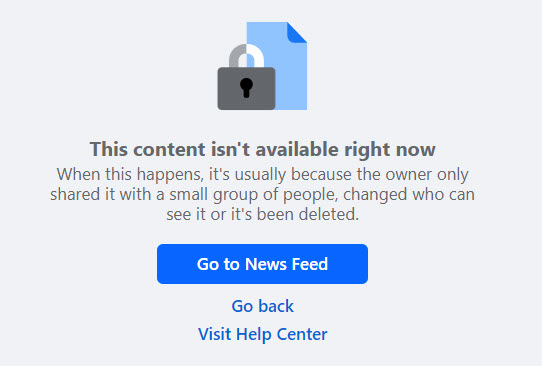
Shut down your social accounts gracefully rather than just pulling the plug.
Stay Positive!
You need thick skin to be online. Candidates encounter online comments disparaging them and their campaign all the time.
The most natural instinct is to strike back with a nasty or sarcastic reply. In the end, though, it’s better to take the high road and actively protect your reputation.
Have a plan in place for dealing with negative material. If there is negative material that happens to be true, prepare to address it directly. Fight back against false rumors and information with the truth. Then return focus to the issues that are important to your voters.
How you respond to both large and small crises will define you and your leadership skills for voters.
Use some simple SEO on your social profiles to boost your online presence. Your bios should include the candidate’s name as it appears on the ballot, the year, and the full position that you are running for. Social profiles are also a great place to include your campaign website link. And check your privacy settings.
Talk with your followers; don’t broadcast to them. Reply to comments, even negative ones. Host live Q&A sessions, such as Facebook Live. Watch the social trends for content ideas, and use relevant hashtags when you post.
For more tips and ideas for digital campaigning, subscribe to our email list below and check out our book Running for Office as an Online Candidate.
Image courtesy of debspoons at FreeDigitalPhotos.net
Making Your Campaign’s FAQs Work Harder for You
One problem facing local political campaign websites is that there just isn’t enough content. There are times when we get little information about a candidate, their positions, or even why they are running.
A lack of material makes building out a website difficult. This applies to both text and photos when there’s little provided for us to work with.
If you find yourself starting a campaign site or updating one, there’s a pretty simple way to expand your content.
Incorporate some frequently asked questions!
The Power of a Well-Crafted FAQ Section
FAQs can improve a visitor’s active engagement and help build trust and transparency. Addressing common questions about yourself and your policies helps make information easier to find and understand. And answering tough questions directly shows you’re not just knowledgeable, but also honest.
What to Ask and What to Answer
Start by categorizing your most asked or most likely questions. Group them into sections like policy positions, your background, campaign specifics, and how to vote. Read through your existing campaign material, organize your initial questions, and start writing out the answers for later reference.
Remember, what seems obvious to you might not be to everyone. You may live and breathe policy details and the current political situation, but most voters do not.
Consider these categories:
- Policy Positions: Cover your stances on key issues. This could include local development, education, economic policy, environmental concerns, and more. If you break out your policies into separate pages, place relevant FAQs on each page. Start your list with the most common question or one that would get the most attention.
- Your Background: Share information about your personal history, your qualifications, and what motivates your candidacy. This can be appended to your about page.
- Campaign Specifics: You can even add Q&As to provide details about campaign events, volunteer opportunities, and donation information.
- How to Vote: Your voting information page is perfect for detailing voting procedures, including registration, polling locations, mail-in ballots, and important dates.
Grouping and splitting FAQs helps organize the content and makes it easier for users to find information.
Example FAQs for candidates seeking various offices:
Local Office Candidate:
- Q: What are your plans to improve local schools?
- A: I plan to advocate for increased funding for our schools. I will also promote the integration of technology in classrooms, and support policies that attract and retain qualified teachers.
State Legislature Candidate:
- Q: How do you propose to address the state’s budget deficit?
- A: My approach includes reviewing and adjusting wasteful spending. I want to explore new revenue sources without overburdening taxpayers. I also want to invest in economic growth initiatives to bring in new business and increase our tax base.
Congressional Candidate:
- Q: What is your stance on healthcare reform?
- A: I believe in affordable healthcare for all. This includes supporting measures to reduce prescription drug prices, protecting pre-existing condition coverage, and expanding public healthcare options.
“Write content in the active voice: A sentence is said to be in the active voice when the subject of the sentence performs the action of the verb. For example, ‘The dog bit the mailman’ is better than ‘the mailman was bitten by the dog.’” – Running for Office as an Online Candidate
FAQ Tips
- Be Clear: Your answers should be easy to understand. Don’t use jargon and complex language. If it wouldn’t make sense to someone unfamiliar with a particular issue, simplify it.
- Don’t Dodge the Difficult: Address sensitive topics head-on with honest and considerate answers. If you have a position, explain it. This shows you’re not just open but also respectful of differing viewpoints.
- A Picture Is Worth a Thousand Words: Sometimes, text isn’t enough. Embedded videos, infographics, and links can be added into your answers. These elements help break up the text and keep engagement high.
- Don’t Let FAQs Be Everything: Don’t let FAQs be a replacement for your main content. Your whole site can’t just be lists of questions and answers. (It could, but that would be odd.)
- Keep the Lines Open: Allow visitors to submit questions through your site’s contact page. You can also ask for feedback on your website or through social media.
- Have a Little Fun: Throw in an interesting or fun related question just to keep things relatable. This is good to add on your About page.
- Update When Necessary: Update your content with new questions or answers due to events or policy changes.
After visitors have their answers, what’s next? Whether it’s volunteering, donating, or learning more, guide them to the next step. Consider adding a call to action to each page or FAQ block.
Your FAQs are a simple way to get your points across without going into excessive detail. Another great benefit is that all that information can help with your site’s search optimization.
Once you’ve added your FAQs, go back through them, and have others read through them as well. Do your answers speak to your values and the concerns of your voters? Are there any obvious questions that are missing?
In the end, it’s about making it easier for voters to learn more about you and about your platform.
Need help writing or revising your content? We offer a copy editing service for website clients of Online Candidate. For content ideas and digital writing tools, visit OnlineCandidateResources.com.
10 Things That Separate Winning Candidates From Losing Candidates
What separates winning political candidates from those who lose elections? It’s more than just the number of votes.
There’s no such thing as a perfect campaign. Regardless of how hard a candidate may work, there are many factors that can contribute to an Election Day loss. Have you ever wondered what truly distinguishes the winners? It’s rarely as straightforward as the poll numbers might suggest.
Here are some key strategies and often-overlooked details that set successful campaigns apart from the rest:.
1) Failing to put together a campaign plan. You can enter a race late, but you can never start preparing for one early enough. Plan your election season calendar, organizational structure, fundraising strategy, and budget. Learn about the position you seek and the issues that will define the campaign. A robust digital strategy should be put together for your social media presence and how you will connect with people online.
2) Lacking a coherent campaign message. Through your issues and personal story, convey a clear and compelling vision for your community. Define yourself, define your opponents, and let voters know what’s at stake in the election. Stick to your talking points as repetition creates consistency in your positions. Your campaign message may need to shift as things change. But you should always stay true to what you stand for.
3) Focusing on issues that most voters don’t care about. In one local election where we live, a candidate constantly harped about the problem with dog waste on our sidewalks. She did it so much that we called her the ‘dog poop candidate’. With everything going on at the time in our area, stressing that particular issue over others simply did not motivate voters… and she lost.
4) Treating fundraising as a secondary task. Raising money for a campaign is hard and it takes time. Start early and start strong. Don’t limit gathering financial support from just friends and family. Weak fundraising efforts will prevent you from reaching your campaign goals. Set up online fundraising tools as early as you can. Budget for your initial fundraisers, and be realistic about how much you will be able to raise throughout the season.
Sometimes this becomes a chicken and egg situation, where you need to raise money to hold fundraisers, but you need fundraisers to raise money. Consider how you will raise seed money. It may be through a personal loan or through donations from close family and friends. You may not like or feel comfortable asking people to contribute, but it’s something you need to do if you plan on a political career.
5) Failing to personally reach out to others. Following the global events 2020, many candidates adopted and continue to effectively use remote campaigning techniques. While online events and connections are useful, don’t forget that the personal touch matters most whether reaching out to donors or voters.
6) Candidates that manage their own campaigns. A campaign manager should be dedicated to handling the day-to-day operations of a campaign, not the candidate. While some very local elected positions can be a single-person operation, most political campaigns are far too complex and time-consuming for an individual to handle without help. Campaign managers should typically be people with a lot of experience and connections in the community. They should also have a strong understanding of electoral rules and campaign management. They need to have a knack for networking, be willing to take risks, and have the ability to balance strategy with political acumen.
7) Putting too much priority on things that have little effect on the election. Sure, designing attractive campaign pins can be fun, but are they really that important? Focus on activities that will make a difference. For example, don’t overlook the role of your volunteers. If you don’t have a plan for how to engage them, you might not make the best use of them.
8) Spending too much money on polling and paid media outreach. Do not just rely on digital ads and email. Focus on building an organization of supporters and volunteers who will work toward promoting the campaign.
9) Spending too much, too soon. See point #1 on planning a budget. Set your campaign budget and stick to it. Underestimating how much you will spend can lead to a tough situation, especially in the last few weeks of a race. Getting additional donations in the final days can be helpful, but don’t count on them for your get out the vote efforts.
10) Failure to ‘make the ask’. This includes failing to make the ask for donations – and even failing to ask for a vote. Tell voters what you want them to do. Tell them on every print piece, and them on every page of your campaign website. If you are asking for donations, make it easy for them to do so. If you want their vote, don’t forget to give them the election date! When asking for support, just be straightforward. Whether it’s for donations or votes, make it clear how people can help.
It all makes a difference
If there is a common thread to this list, it’s that running for office takes a lot of preparation. We’ve seen personally, on a local level, people who really want to make a difference or want to make a change in their community just jump into the political process. They may run virtually alone, doing everything themselves and perhaps trying to do it on a shoestring budget.
Unfortunately, more times than not, these candidates don’t win. They may often be the best, most qualified candidate. They may know policy and they may know how to get things done.
The only thing they failed to learn was how to properly run a political campaign.
Don’t let it happen to you.
Read More: 5 Mistakes Political Candidates Make Online
With affordable political website packages and services, Online Candidate can help launch your digital presence.
Social Media Dos and Don’ts for Political Campaigns
Starting to use social media for your political campaign? Before you start posting, we’ve put together a handy list of dos and don’ts for your social media interaction on Facebook, Instagram and X / Twitter.
Below is a detailed infographic that outlines key tips for political social media best practices.
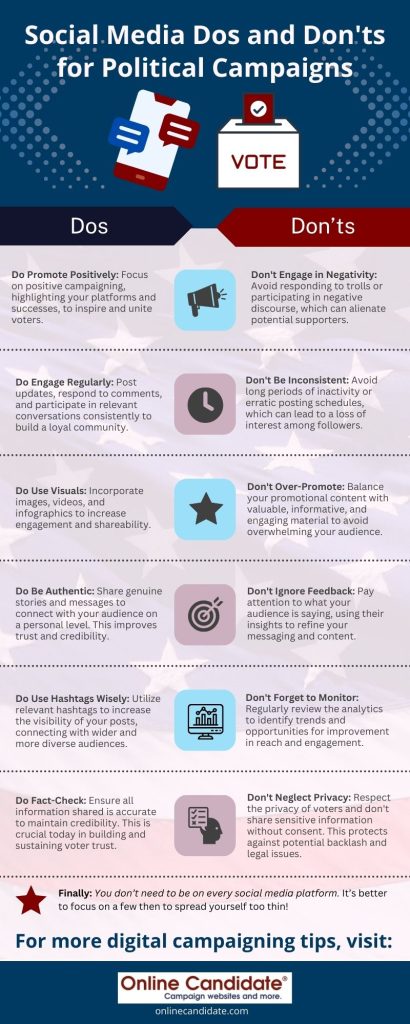
This infographic serves as a quick guide for political campaigns using social media. It’s divided into two main sections: what campaigns should do and what they should avoid.
The “Do” section encourages regular social engagement, the use of visuals, authenticity, positive promotion, wise hashtag use, and the importance of fact-checking.
On the flip side, the “Don’t” section warns against neglecting privacy, engaging in negativity, over-promoting, ignoring audience feedback, being inconsistent, and forgetting to monitor post performance.
Download a high-resolution version of this infographic for your personal use or to share with colleagues
Found this infographic useful? Feel free to share it on your social media or embed it on your site with the provided embed code below.
<a href=”https://www.onlinecandidate.com/articles/political-social-media-dos-donts” target=”_blank” rel=”noopener noreferrer”>
<img src=”https://www.onlinecandidate.com/articles/wp-content/uploads/dos-dont-political-social-media.jpg” alt=”Dos and Don’ts for Political Social Media Infographic” style=”max-width:100%;”/>
</a>
Related Content:

